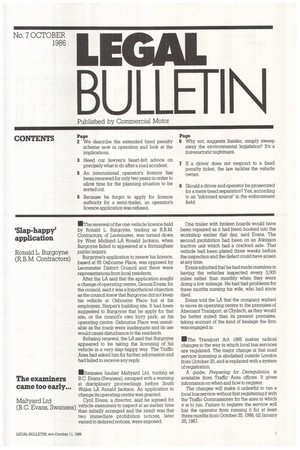'Slap-happy' application
Page 57

If you've noticed an error in this article please click here to report it so we can fix it.
Ronald L. Burgoyne (R.B.M. Contractors)
• The renewal of the one-vehicle licence held by Ronald L. Burgoyne, trading as R.B.M. Contractors, of Leominster, was turned down by West Midland LA Ronald Jackson, when Burgoyne failed to appeared at a Birmingham public inquiry.
Burgoyne's application to renew his licence, based at 55 Osbourne Place, was opposed by Leominster District Council and there were representations from local residents.
After the LA said that the application sought a change of operating centre, Dennis Evans, for the council, said it was a hypothetical objection as the council knew that Burgoyne did not keep his vehicle at Osbourne Place but at his employers, Harper's building site. It had been suggested to Burgoyne that he apply for that site, or the council's own lorry park, as his operating centre. Osbourne Place was unsuitable as the roads were inadequate and its use would cause disturbance to the residents.
Refusing renewal, the LA said that Burgoyne appeared to be taking the licensing of his vehicle in a very slap-happy way. The Traffic Area had asked him for further information and had failed to receive any reply.
• Swansea haulier Maltyard Ltd, trading as B.C. Evans (Swansea), escaped with a warning at disciplinary proceedings before South Wales LA Ronald Jackson, An application to change its operating centre was granted.
Cyril Evans, a director, said he agreed for vehicle examiners to inspect at an earlier time than initially arranged and the result was that two immediate prohibition notices, later varied to delayed notices, were imposed. One trailer with broken boards would have been repaired as it had been booked into the workshop earlier that day, said Evans. The second prohibition had been on an Atkinson tractive unit which had a cracked axle. That vehicle had been plated three weeks before the inspection and the defect could have arisen at any time.
Evans admitted that he had made mistakes in having the vehicles inspected every 3,000 miles rather than monthly when they were doing a low mileage. He had had problems for three months nursing his wife, who had since died.
Evans told the LA that the company wished to move its operating centre to the premises of Abernant Transport, at Clydach, as they would be better suited than its present premises, taking account of the kind of haulage the firm was engaged in.
• The Transport Act 1985 makes radical changes to the way in which local bus services are regulated. The major change is that road service licensing is abolished outside London from October 25, and is replaced with a system of registration.
A guide, Preparing for Deregulation, is available from Traffic Area offices, It gives information on when and how to register.
The changes will make it unlawful to run a local bus service without first registering it with the Traffic Commissioner for the area m which it is to run. Failure to register the service will bar the operator from running it for at least three months from October 25, 1986, till January 25, 1987.
























































































































